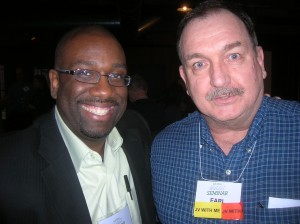I bet you have taken the time to search for your businesses web site on Google just to see where it ranked. When you searched for it by name using your url or most of the words of your domain name it probably did pretty well. However if you are a bakery, and search for “Bakeries”, the odds are that you are in the nether regions of the 13,900,000 listings.
A lot of small business people have given up on their websites as a result of this apparent invisibility. The gallop to the internet was all the rage before and after the dot com bust. However, for most small businesses, it has had little if any positive effects for their business.
The alternative that was easiest to figure out was to buy pay per click ads. They cost money, but at least they had an active prospect on the other end – usually. When some one did click on the ads, they were shown your offer and either did or didn’t buy.
At first a lot of keywords were real cheap, as little as a dime or less. Some still do, but many clicks these days run from $2-5 each and some go well beyond that into the $20 -$50 each and even much higher. You really need to know what you are doing to spend that type of money. And yet it can be well worth it.
Initially the pay per click ads were on the right side of the “organic” listings. The term organic listings refers to the free information that Google would find relevant to a searchers keywords. These free organic listings are the target we are shooting for when we try to get a top Google listing. Eventually, Google added some ads on the top of the left side as well, but we are still referring to the top organic listings.
When thinking about the value of this top organic spot, we can compare the value by looking at the equivalent cost of the top ads for the same search term.
It would cost $25 for 100 clicks to the advertiser. And this would be the equivalent value for 100 clicks on any of the organic searches.
Thus if a business were to get their organic site listed so that it got a hundred clicks a day, that listing would be worth the equivalent of $25 a day to them.
Now multiply this out for higher pay per click rates of say $2-5 each or much higher. Some keywords get a lot of searches every day, and this could multiply the value. The term “dog training” for example gets over a half million searches every month in the US alone. Dog training is a competitive word that would cost you $2.44 on average if you wanted to get the maximum pay per click volume for it. According to Google’s Traffic Estimator, if you were the top advertiser, you would expect to get 358 people clicking on your add every day, costing you $895.28. [Note that estimate of 358 people is 2% of the daily traffic.] (550,000 / 30 / 358) = 2%]
On the surface this would seem to indicate that have a top organic listing for Dog Training on Google would be worth almost $900 a day, assuming that the top listing got the same number of clicks as did the top ad.
It does not.
It probably gets a lot more.
Some time ago, as many as a fourth of all visitors would click on one on the ads on they typical results page. Recently, that number is closer to 18%
Industry experts suggest that a whopping 43% of people will click on the top organic result. This is significant.
It is even more significant when we understand that the percentage of people clicking on ads means those clicking on any of the ads.
Thus the top organic search result is getting between 8 and 22 times as many clicks as the top pay per click ad!
Calculating the results for our Dog Training example where the pay per click ad was worth about $900 a day, our top ranked listing should be worth roughly anywhere from 7 to 20 thousand dollars!
And that is why, getting to the top of Google’s Organic search is so valuable. As a result a whole new consulting industry has emerged to deal with this potential for value creation. Getting a listing to the top of the search engines is a worthy goal.
There are some additional caveats that need to be taken into account, but the central thrust of the above still holds true. People who choose the ads may for example be more actively looking to make a purchase compared to those who click the organic results who may be more interested in getting information.
Being the top organic listing may be meaningless, if the page people are taken to does not result in a desired action, etc.
That said, it should be obvious that getting a top organic search result is worthwhile.
[tags]Google, google Ranking, Organic Search value, top organic search, SEO, SEO Value, Why do SEO, Search Engine Optimization, pay per click[/tags]
